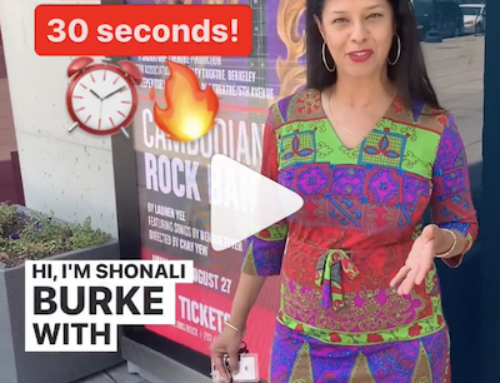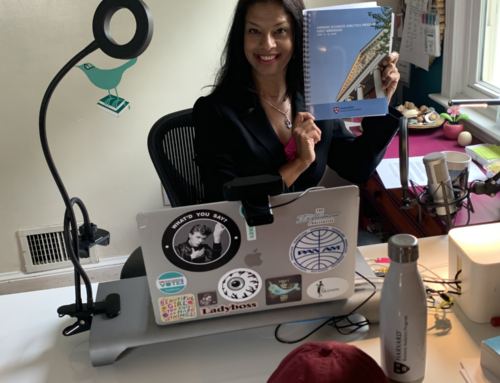Yesterday I received one of the most unusual calls in recent memory. It was from a recruiter with Profiles, who’d presented me for a position here in DC several months ago. Times are bad, hiring is slow; still, the process with this particular position has been dragging on for several months now.
When my path first crossed that of this recruiter, I made it clear to her that I didn’t expect her to “get me” this job; but what I did ask for was for whatever the final decision was to be communicated to me. I’ve encountered some recruiters who don’t do that, and there is nothing more off-putting than not knowing where you stand. As Rachel a.k.a. Jennifer Aniston said, “That, my friend, is what they call ‘closure’.”
Well, this recruiter walks the talk. While I have no idea whether we’re anywhere near the finish line, she has consistently kept in touch with me to try to keep me engaged. She follows up regularly with the hiring organization, and lets me know what their response has been. And when they do make their final decision, I know she will communicate it – whatever it is – to me.
For someone who’s not working for me, as Lindsay Olson explains in this excellent post, I call that pretty good “people relations.” Good people relations is something that not just PR professionals, but everyone, should aspire to – including recruiters.
Recruiter Horror Stories
We’ve all heard the horror stories about job candidates. Ad nauseam, I might add. But what about the recruiter horror stories?
Apparently there are quite a few, as my Twitter network told me:

Jason Buck “had an ‘interesting’ experience at temp agency party, where one very drunk recruiter told me exactly what she wanted from me, in earshot of all… I won a bottle of champagne at the next party for being ‘the most adaptable temp.’ ”
Another (whose identity is concealed on request) had this experience:
1. Brought me in to interview in October – seemed positive
2. Sent writing sample, never heard back
3. The main recruiter left – still hadn’t heard back
4. Move to November, I got laid off
5. They had me come in to interview three times, and meet with about eight people
6. Never heard from them again – by then I was so put off I didn’t care anymore though
And one of my Facebook friends, who also requested to remain anonymous, went through 10 (yes, 10) interviews to join a global recruiting firm; discussed a possible niche practice with the COO; drove 100 miles through a snowstorm for the final (10th) interview only to be told she was “more concerned with moving up the ladder than learning the ropes of the business.” Her subsequent emails and phone calls were not returned.
The Bottom Line
No, job candidates should not chew gum or eat brownies during interviews. They should present themselves professionally, and follow up diligently and politely. And they should not expect recruiters to work for them – that is certainly not the way it works (though often good recruiters will give candidates tips and an insight into the recruiting process, as Lindsay and several others do).
But candidates can expect recruiters to work with them, and afford them the same courtesies they would like to see returned. After all, job hunters are people too. And when the economy turns, these same candidates, who are beating down every door they can see right now, might just be in a position to do someone a favor.
It’s called good people relations.
What do you think? Do you have tips for recruiters – or candidates – that you’d like to share?
Thanks to @KarenRussell, @jasonbuck and everyone else who contributed to this post.


![[EVENT]: PR Hacks for Small Biz (online)](https://shonaliburke.com/wp-content/uploads/2021/06/FB-Ad-1200x800-01-01-01-Copy-500x383.jpeg)






[…] But the ones who are good, are really really good. […]
[…] But the ones who are good, are really really good. […]
[…] But the ones who are good, are really really good. […]
[…] I’ve come across my share of bad recruiters, but the good ones are like gold. […]
Thanks for the comment, Eric. I think HR departments in companies can be quite overwhelmed, so for the most part they don’t call back unless one’s being considered for the position. I do think it should be different with recruiters who actively pursue, and present, you for a position, though. There are many good recruiters who do this, but unfortunately the “not so good” ones can give them all a bad name (much like PR!).
I have come to the realization that there are very, very few companies that follow the hoped-for protocol of letting you know how things are going. I have interviewed with a number of sports properties including some big sanctioning bodies and have not once gotten a call after the interviews (unless I got the job!) I have always made the calls to get the info, but perhaps I am a little impatient that way… :)
Thanks, Rosaline – I agree completely. A cold call is one thing, but if a recruiter has actually put you through your paces… well, that deserves a response.
Great posts and interesting experiences! I recently went to an interview with a company for a PR position. For the most part, they were great and timely, the recruiter even asked for my feedback immediately after the interview. I checked in some weeks later and they said they had just filled the position. As busy as everyone is, it would have been nice to receive “closure” and I don’t think it is too much to ask for one if you’ve actually been through their interview process, meeting everyone in the department. Now if I was just calling to check in without an interview, that’s a different story.
Susan, Barbara & Jason –
Thanks so much for your comments.
Susan – you’re absolutely right, it’s a two-way street. It’s critical for candidates to be professional and understand how your business works, and I do think more are beginning to “get it.” But it’s great when smart recruiters (like you) also understand the value of a quick and courteous response to job-seekers, especially those they are already working with. As you point out, the advent of social media can be great help in our time-compressed days.
Many years after my ‘interesting’ temping experience, I now have a number of good (UK) recruitment agents. One in particular (www.zebrapeople.com) has proactively helped place me in contracts to fill gaps in CV and even spent time on the phone critiquing my CV/resumé.
Oh … and I have never had quite the same conversation with them as I did with the others :o)
J
At one company where I worked, the application process was so unnecessarily arduous. Candidates were subjected to a group presentation, a written test, and a case study interview. Because the job postings were not targeted well, the group sessions included hundreds of people. Eventually rumors began circulating on craigslist that the company was not hiring, but was actually running some sort of experiment.
A group of team members finally convinced the senior management to abandon this process. The bottom line: fewer than ten hires had resulted from this process, which must have cost tens (if not hundreds) of thousands of dollars over several years. If the company was going to fill its open positions, we needed a much more streamlined approach.
Great post!
I agree, recruiters need to be polite and understanding and should follow-up. But there are times they just can’t–when you have hundreds of candidates. There is a set of expectations that both recruiters AND job seekers have to understand. We have to meet in the middle.
Recruiters need to make more of an effort to follow-up and reply especially to those who have gone through the interview process.
But job seekers have to understand too that they aren’t going to hear back on every resume and every application. They are one seeker of perhaps hundreds or even thousands in this market. Take control of your search. Own it! Follow-up and ask for where you stand. Don’t sit back and wait. Be persistent but professional.
Similarly, recruiters need to better understand customer service. Have processes in place, even if automated, to get back to applicants. Use social media where you can to respond to questions and help applicants understand.
It is a two-way street.